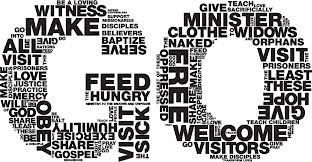Psalm 8 is attributed as “for the Winepress [gittigh in Hebrew].” That’s the place where the harevest is tunred into a vintage, where the crop is stripped of its coveringand supports, to become what is truly is. Many of the ancient mystics and leaders of the Church talked of the church as a inepress in which the saved are seapareted from the lost, in which the Word of God is processed (Augustine of Hippo, 4th CE) and in which we experience the effortless mystery [Chrysostom, 4th CE] of the uncontained God [Cyril of Jerusalem, 4th CE].
Psalm 8 begins and ends with an affirmaiton of the power, soverignty and love of God it poetically tells the identity of God in the middle. Even the smallest, weakest and youngest know that God is soverign. The ennemies of God cannot stop such knowledge, which is visible to anyone who looks at the heavens of creation. As sinful as we are as human beings, we are chosen, loved, claimed, implicated in God’s plan for creation – given the responsibility of dominion of what God has made, for us to enjoy, contemplate and care for. The song of praise connects our vocation to God’s identity, our humaness to the divine goodness of God’s name. It is not merely a marevelous description of God’s identity, but also a sort of cliff’s notes of what it means to be human and to follow the God we know in Jesus.
Matthew 28 is end of Matthew’s account of Jesus. After the passion narrative, the death of Jesus and the violent destruction of his movements to bless the persecuted and forgotten, things are turned upside down. In the end, the world is set back rightside up. Jesus, unjustly demonized, is recongized as and invested with the authority of God – sending out, setting the people of God in motion from Abraham and Sarah, to Moses, to Ruth, to the disciples in the upperroom. Pradoxically the small, minority, margibal community of disciples here is commissioned to nothing less than worldwide mission in proclaiming obedience to Jesus and his teaching. Those friends charged with this task and mission – which can seem impossible – are reassured, esus not only sends them but promises to be present with and alongside them. In a mission bound to collide and conflict with the Empire or Rome, and all empires which places themselves in the place of God alone, the mission of the church is to dominate the world, but not in a milatristic or ethnocentrist way. Rather it’s the proclamation, teaching and baptism into a different Empire, God’s Kingdom, just and life-giving, planted in the world like a mustard seed, light in the darkness, salt in bland or rotting food. The Great Commission is perhaps less about what we imagine as evangelism and proselytism than it is about being icons of God’s transcedant power and love, reflecting illuminating light, subversive growth, rich and preserving flavor to our world over which God reigns, and we are entrusted with the task of making wine from the abundant harvest.
Questions for Going Deeper:
• What word, phrase or image in the text grabs you?
• How have you experienced the magnificence of God?
• How do you share that, or pay it forward?
